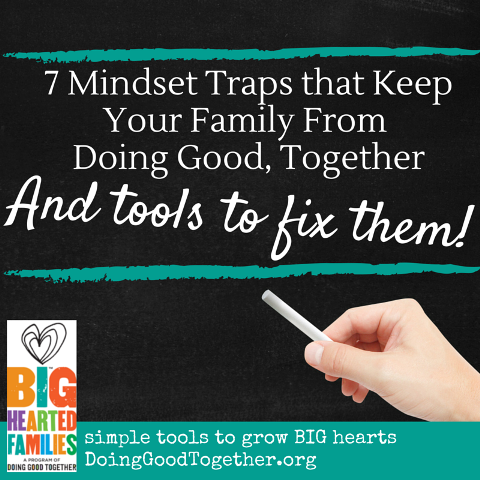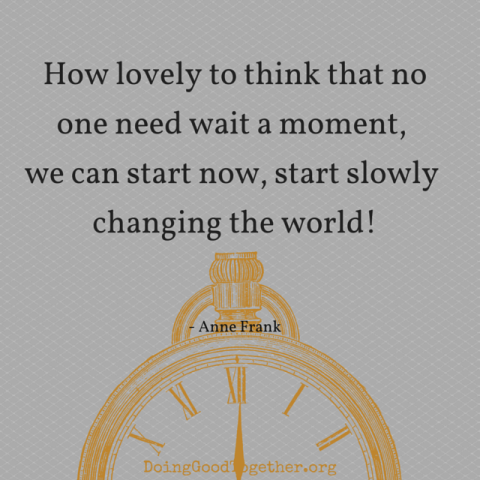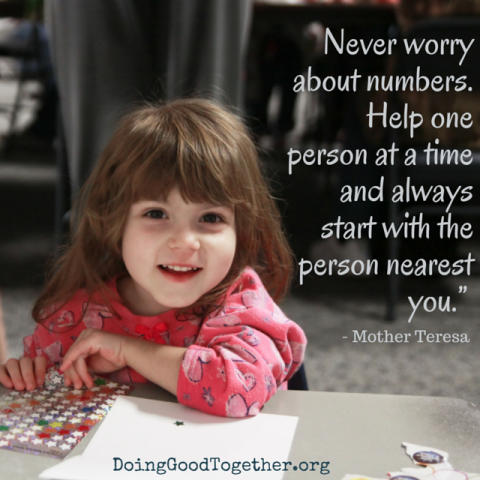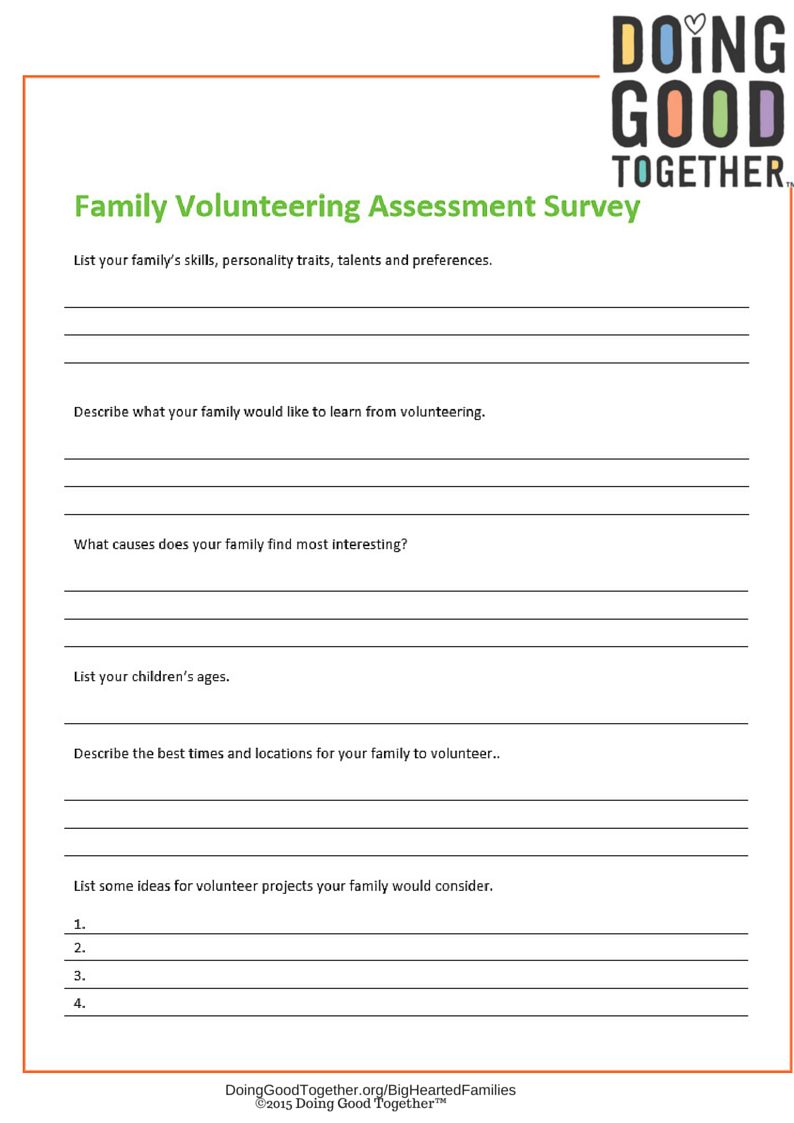7 Mindset Traps that Keep Families from Giving Back
And tools to fix them!
By replacing these fixed, negative thoughts with open-ended, growth-centered questions, you’ll be able to move past the mindset traps and start successfully practicing kindness with your family.
1. Instead of saying:
We’re too busy!
We’ll try a family service project later, when there is more time.
Try asking:
How can an act of kindness fit in with what we are already doing?
It’s true. Most families are stretched to their limit. But that’s one of the best reasons to volunteer together. Whether you volunteer only occasionally, or regularly, it’s an opportunity for you and your children to spend time together doing something both worthwhile and fun.
While our focus on our children's physical and academic development keeps us busy, we need to make space and time to put some focus on caring for others and being good citizens. Taking on a community service project or act of kindness together is an opportunity to share our values with children in a concrete way.
It can be as simple as spending a Saturday doing yard work together for a neighbor who is elderly or disabled or picking up extra groceries for the food shelf during regular shopping trips.
2. Instead of saying:
My child is too young.
Try asking:
How can I get him or her involved?
It's never to early to practice compassion!
Even infants (some might say especially infants) can make a difference. Put your son or daughter in a stroller and walk to raise money for Alzheimer's disease or breast cancer. Ask a local nursing home if there is an older person your family could "adopt," then visit with your baby every week or two.
Most toddlers and preschoolers begin to enjoy the more crafty service projects in our Big-Hearted Families™ program, and as your children get older, they are less likely to resist the idea of spending free time helping others if it is already a regular part of your family life!
3. Instead of saying:
I need to toughen my child up for the real world.
Try asking:
How can I empower my child to be part of the solution to real world problems?
In this hardened world that celebrates cynicism and practically mandates narcissism, it's easy to feel like a rube in the role of kindness crusader. This sort of thinking discounts the immense good that can grow from one small act of kindness and one big-hearted kid.
Instead of worrying that kindness will leave kids vulnerable, challenge your children to make change and be part of the solution. Check out NewtownKindness and their annual Charlotte Bacon Act of Kindness awards for outstanding examples of big-hearted kids making brilliant contributions to their communities.
4. Instead of saying:
If we don't have much time to give, we won't make much of a difference.
Try asking:
How can we do good during our regular routine? And what would happen if we made room for service?
If you’re busy with soccer games and find yourself with time in the stands, try engaging younger siblings in decorating bags for Meals on Wheels in the stands, or help out with the carpool, or bring a snack for the team. Take a look at what you’re already doing, and discover new ways to work kindness into that routine. Visit our Pick a Project page for ideas.
Or carve out space on your calendar. Doing a good deed doesn’t need to take as long as you think!
In just half an hour at your own kitchen table, your family can create cards that brighten a very sick child’s day or write letters to your representatives advocating an issue you think is important. Those small acts in and of themselves make a difference. By lifting that child (and her parents’) spirits, you’ve eased some small portion of the stress in her life. By sharing your concerns with your elected leaders, you strengthen our representative democracy.
Beyond these simple, straightforward impacts, your work teaches your children that kind contributions can be made every day at every level. As they grow, they will almost certainly be inspired to make a difference in their own ways.
Imagine the cumulative effect of a lifetime of small contributions and the ripples they have through our communities.
5. Instead of saying:
I don’t want to put my child (or myself) in an uncomfortable situation. We might say or do the wrong thing.
Try asking:
How can I prepare myself and my child so we know what to expect?
Prepare everyone for the experience you are about to have.
- Talk to your children about their expectations and assumptions.
- What do you think you will do and what will it be like?
- What needs does this job fill?
- What impact will you have?
- Is there anything that makes you nervous or uneasy?
- Describe what the experience will be like. (“When we get there, we’ll unload our groceries. Dad will start chopping vegetables, and you and I will set the table.”)
- Read a book or visit a website that can educate your child on the issue you’re about to work on.
Don't forget, each of our projects offers specific reflection questions to get your family talking.
Plus, whatever organization you are working with is sure to offer tips or suggestions. Visit their website or call for more information. They engage new volunteers all the time!
6. Instead of saying:
I just can’t handle one more thing on the list right now.
Try asking:
How can I take a step back and gain some perspective?
Fight stress and that sense of overwhelm by shifting your focus outward with your children. Take ten minutes and try one of our Quick Acts of Kindness. Practicing compassion requires you to expand your thinking and gain a new perspective. At the very least, you’re spending ten fewer minutes focused on present-moment worries.
7. Instead of saying:
I just can’t find the perfect volunteer opportunity.
Try asking:
How can my family make a difference?
Let go of perfection! You just might discover the perfect volunteer experience for your family when you least expect it.
We offer four big-hearted worksheets that will help you get started. Use them to think through your family’s interests, talents, time, and treasure. These details will help you determine the best way to begin your kindness practice. Check out the links below, browse our projects, and know that making a difference will be a memorable, meaningful family experience, whether it’s perfect or not!
- Family Volunteering Assessment Survey: 6 simple questions get you started.
- Time & Talent: 6 simple questions for the kids.
- If I Ran the World: Imagine your impact and find a way to make it happen!
- Helping Habits: Add acts of kindness to your family's favorite activities.






